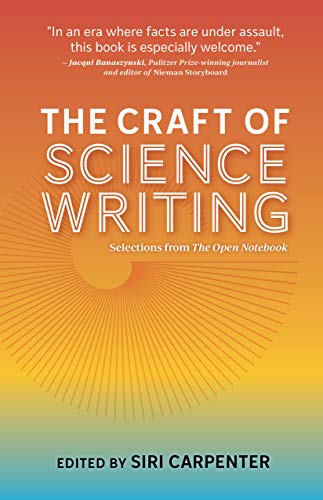Laura Helmuth
Health & science editor at @washingtonpost. Past president of National Association of @ScienceWriters. Formerly @NatGeo @Slate @SmithsonianMag @NewsFromScience
Book Recommendations:
Recommended by Laura Helmuth
“"Helping science journalists and others interested in communicating about science develop the skills to do so is @Open_Notebook's mission." The Open Notebook book, the Craft of Science Writing, is out now & it's fantastic. @SiriCarpenter @sciam https://t.co/fIx9JMb3AB via @sciam” (from X)
Science journalism has perhaps never been so critical to our world--and the demands on science journalists have never been greater. On any given day, a science journalist might need to explain the details of genetic engineering, analyze a development in climate change research, or serve as a watchdog helping to ensure the integrity of the scientific enterprise. And science writers have to spin tales seductive enough to keep readers hooked to the end, despite the endless other delights just a click away. How does one do it? Here, for the first time, is a collection of indispensable articles on the craft of science writing as told by some of the most skillful science journalists working today. These selections are a wealth of journalistic knowledge from The Open Notebook, the online community that has been a primary resource for science journalists and aspiring science writers for the last decade. The Craft of Science Writing gives you a crew of accomplished, encouraging friends to whisper over your shoulder as you work. In these pages, you'll find interviews with leading journalists offering behind-the-scenes inspiration, as well as in-depth essays on the craft offering practical advice, including: How to make the transition into science writingHow to find and pitch a science story to editorsHow to wade through a sea of technicalities in scientific papers to spot key factsHow to evaluate scientific and statistical claimsHow to report on controversial topicsHow to structure a science story, from short news to long featuresHow to engage readers in a science story and hold their attention to the endCONTRIBUTORS TO THE CRAFT OF SCIENCE WRITING: Christie Aschwanden, Siri Carpenter, Tina Casagrand, Jeanne Erdmann, Dan Fagin, Dan Ferber, Azeen Ghorayshi, Geoffrey Giller, Laura Helmuth, Jane C. Hu, Alla Katsnelson, Roxanne Khamsi, Maggie Koerth-Baker, Jyoti Madhusoodanan, Apoorva Mandavilli, Amanda Mascarelli, Robin Meadows, Kate Morgan, Tien Nguyen, Michelle Nijhuis, Aneri Pattani, Rodrigo Pérez Ortega, Mallory Pickett, Kendall Powell, Tasneem Raja, Sandeep Ravindran, Julia Rosen, Christina Selby, Alexandra Witze, Wudan Yan, Ed Yong, Rachel Zamzow, Sarah Zhang, Carl Zimmer.
Recommended by Laura Helmuth
“@audubonsociety @asher_elbein @NicoSGonzalez @JasonWardNY If you enjoy how birb and floof and snek and other fun words and fonts and linguistic cleverness spreads through social media, you'll love @GretchenAMcC and her book Because Internet https://t.co/wyzMUECeft” (from X)
THE ACCLAIMED NEW YORK TIMES BESTSELLER. Because Internet is for anyone who's ever puzzled over how to punctuate a text message or wondered where memes come from. It's the perfect book for understanding how the internet is changing the English language, why that's a good thing, and what our online interactions reveal about who we are. Language is humanity's most spectacular open-source project, and the internet is making our language change faster and in more interesting ways than ever before. Internet conversations are structured by the shape of our apps and platforms, from the grammar of status updates to the protocols of comments and @replies. Linguistically inventive online communities spread new slang and jargon with dizzying speed. What's more, social media is a vast laboratory of unedited, unfiltered words where we can watch language evolve in real time. Even the most absurd-looking slang has genuine patterns behind it. Internet linguist Gretchen McCulloch explores the deep forces that shape human language and influence the way we communicate with one another. She explains how your first social internet experience influences whether you prefer 'LOL' or 'lol', why ~sparkly tildes~ succeeded where centuries of proposals for irony punctuation had failed, what emoji have in common with physical gestures, and how the artfully disarrayed language of animal memes like lolcats and doggo made them more likely to spread. 'McCulloch is such a disarming writer - lucid, friendly, unequivocally excited about her subject - that I began to marvel at the flexibility of the online language she describes, with its numerous shades of subtlety.' New York Times

